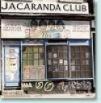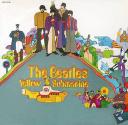 There’s a “fearful symmetry” in Paul’s life at this particular moment. In gray Liverpool of the 50s one day a nervous entrepreneur rented a disused building and sought riches in the latest fad: a coffee bar. Located a few blocks from the art college and both a boys’ and a girls’ grammar school (high school to the US) his chances of moderate success were good. It was a cheap enough project with the impressive steam-boiler-in-miniature, an espresso machine, representing the major investment. A few tiny tables and a lot of mismatched chairs from the street market and a few cans of paint completed his start-up costs.
There’s a “fearful symmetry” in Paul’s life at this particular moment. In gray Liverpool of the 50s one day a nervous entrepreneur rented a disused building and sought riches in the latest fad: a coffee bar. Located a few blocks from the art college and both a boys’ and a girls’ grammar school (high school to the US) his chances of moderate success were good. It was a cheap enough project with the impressive steam-boiler-in-miniature, an espresso machine, representing the major investment. A few tiny tables and a lot of mismatched chairs from the street market and a few cans of paint completed his start-up costs.
Indeed it appears that the Jacaranda was one of Allan Williams few really successful projects as students in numbers found it the perfect hangout – as American students found theirs in the soda shop. These were near-revolutionary changes from their parents who spent their free time in pubs or bars choosing the sedation of alcohol to the stimulation of coffee. (In America coffee houses were popular in the late 50s as “Beat Generation” hangouts.)
Wheeling and dealing in his little coffee bar, dreaming dreams of a hundred get-rich-quick schemes, he gave 5 young men with an undistinguished beat group and more ambition then any other local group a few gigs he’d promoted up out of practically nowhere. The Beatles got these gigs more out of their persistence then any belief Williams had in their chances of stardom. In fact, one way or another he let his one good chance at serious fame and fortune escape him because they were too hard to deal with. (He did in the end make quite a lot of fame and fortune out of his failure.)
50 years from the day the Jac made its first cup of espresso, coffee is again a mad fad and thousands of street-front espresso coffee bars not all that different have opened around the world. And this summer of the 50 year anniversary of the afternoon John met Paul and the Beatles began their hegira, these coffee bars echo with the sound a Beatles music and the fortune Allan Williams lost is being made by others following his plan for glory.





Recent Comments